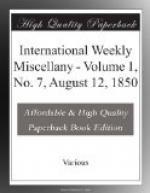The main features of his official life still remain to be noticed. With the exception of Lord Palmerston, no statesman of modern times has spent so many years in the civil service of the crown. If no account be taken of the short time he was engaged upon the bullion committee in effecting the change in the currency, and in opposing for a few months the ministries of Mr. Canning and Lord Goderich, it may be stated that from 1810 to 1830 he formed part of the government, and presided over it as a first minister in 1834-5, as well as from 1841 to 1846 inclusive. During the time that he held the office of home secretary under Lord Liverpool he effected many important changes in the administration of domestic affairs, and many legislative improvements of a practical and comprehensive character. But his fame as member of parliament was principally sustained at this period of his life by the extensive and admirable alterations which he effected in the criminal law. Romilly and Mackintosh had preceded him in the great work of reforming and humanizing the code of England. For his hand, however, was reserved the introduction of ameliorations which they had long toiled and struggled for in vain. The ministry through whose influence he was enabled to carry these reforms lost its chief in Lord Liverpool during the early part of the year 1827. When Mr. Canning undertook to form a government, Mr. Peel, the late Lord Eldon, the Duke of Wellington, and other eminent tories of that day, threw up office, and are said to have persecuted Mr. Canning with a degree of rancor far outstripping the legitimate bounds of political hostility. Lord George Bentinck said “they hounded to the death my illustrious relative”; and the ardor of his subsequent opposition to Sir Robert Peel evidently derived its intensity from a long cherished sense of the injuries supposed to have been inflicted upon Mr. Canning. It is the opinion of men not ill informed respecting the sentiments of Canning, that he considered Peel as his true political successor—as a statesman competent to the task of working out that large and liberal policy which he fondly hoped the tories might, however tardily, be induced to sanction. At all events, he is believed not to have entertained toward Mr. Peel any personal hostility, and to have stated during his short-lived tenure of office that that gentleman was the only member of his party who had not treated him with ingratitude and unkindness.
In January, 1828, the Wellington ministry took office and held it till November, 1830. Mr. Peel’s reputation suffered during this period very rude shocks. He gave up, as already stated, his anti-Catholic principles, lost the force of twenty years’ consistency, and under unheard-of disadvantages introduced the very measure he had spent so many years in opposing. The debates on Catholic emancipation, which preceded the great reform question, constitute a period in his life, which, twenty years ago, every one would have




